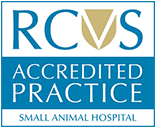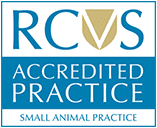Your pet has undertaken major surgery, the following discharge sheet advises what you need to be aware of once your pet returns home.
We are a 24hr practice and should you have any concerns at any time please contact us on 01942 417800.
Your pet has had one or more of the following procedures done.
- Widening of the nostrils
- Removal of the tonsils
- Shortening +/- thinning of the soft palate
- Removal of laryngeal saccules
When your pet first comes home:
- The majority of patients are hospitalised over-night. The vet may elect to, in discussion with yourself, discharge you pet earlier. This is in very select cases and will be discussed with you if in your pet’s best interests.
- It is common that your pet may appear noisier in the first few days. When surgery is performed there is always a degree of inflammation as the surgical site heals.
Medication
- Your pet will be discharged with any of the following medication. Many of these are unlicensed and therefore prescribed under the cascade, you will be asked to sign a document consenting to their use.
- Some medication may be prescribed for several weeks
Exercise
- Keep your pet as quiet as possible. Getting excited, playing and exercise is likely to increase panting and subsequently increase inflammation and make it harder for your pet to breathe.
- If you are struggling to keep your pet calm, please discuss this with the vet who may prescribe calming medication for the immediate post-operative period.
- Exercise should be kept to a minimum, lead only and no more than 10-15minutes at a time for 2 weeks before gradually increasing exercise.
- Always use a Y fronted harness on your pet. We recommend this long term in all brachycephalic breeds. A harness that comes straight across the front of the chest often applies pressure to the trachea (windpipe). Many brachycephalic dogs have a small trachea, and we want to avoid any pressure on this.
Diet
- We advise feeding regular (4-5 meals per day) small amounts of bland, soft food for the first few days following surgery.
- Generally, we advise feeding soft food rolled into meat balls, but some pets prefer very soft food.
- Please supervise all feeds and the following 20-30minutes for the first week after your pet returns home.
- After 4-5 days post-surgery the normal diet can be gradually re-introduced but we advise soaking the kibble thoroughly and no hard food, treats or chews to be given for 2 weeks.
- We do not advise raw food to be fed for the first 2 weeks following surgery while the oral incisions heal.
What to look out for
- It is very common to see some blood from the nostrils following surgery. This may become scabby as it heals. The sutures used, although visible, are dissolvable and will fall out over the next 4-6 weeks.
- Although an increased noise is expected your pet should not be in distress. If your pet appears to be struggling to breathe, panting or unable to settle we advise you contacting the surgery and bringing your pet to our Walter Leigh Way practice as an emergency.
- If your pet coughs up green phlegm, has abnormal nasal discharge and seems to have laboured breathing (you may notice the chest/abdomen making exaggerated movements as your pet breathes) we advise contacting the practice as they may have a respiratory infection.
- If your pet has any vomiting, regurgitation, or lethargy we advise you contact the practice. It is not uncommon for pets to have soft faeces following anaesthetics but if their faeces are liquid or do not firm up within a few days please contact us.
Post-operative care/checks
- We advise using our app to send us a photo of your pet’s nose and a video including sound of their breathing at 2 days and 2 weeks post-surgery. A receptionist will pass this to a vet who will reply. If the vet would prefer to see your pet an appointment will be made.
- If you have any urgent concern regarding your pet, please do not contact us through the app and instead call us on 01942 417800.
Final notes
- When we perform BOAS surgery, we aim to improve your pet’s quality of life. Many pets still have an element of breathing abnormalities. Unfortunately, we are restricted by their conformation. We still advise taking extreme care in the heat, keeping your pet at a lean weight and introducing exercise gradually to unfit pets.





